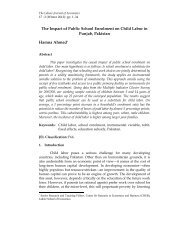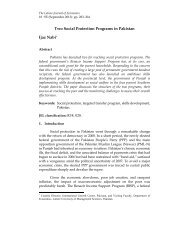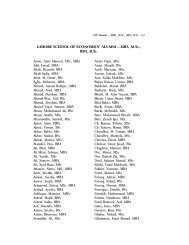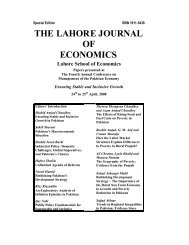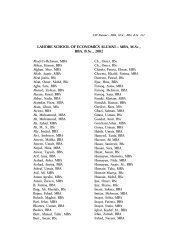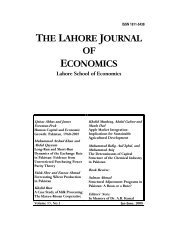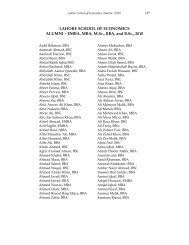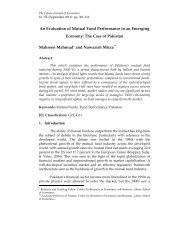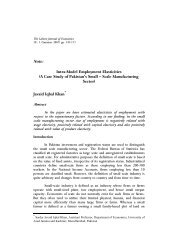Special Edition-07.pdf - Lahore School of Economics
Special Edition-07.pdf - Lahore School of Economics
Special Edition-07.pdf - Lahore School of Economics
You also want an ePaper? Increase the reach of your titles
YUMPU automatically turns print PDFs into web optimized ePapers that Google loves.
Implications for Economic Reforms in Pakistan and other Southern Countries 169<br />
Ironically, the rules prohibiting subsidies were supported and<br />
organized within the WTO by the same countries that are violating the UR<br />
ruling on farm subsidies. Much <strong>of</strong> the blame lies with the AoA itself. In<br />
theory, the Agreement requires all member countries to reduce subsidies<br />
that hinder trade, but numerous loopholes and rules, the ‘peace clause’ for<br />
example, are weighted in favor <strong>of</strong> the more dominant members <strong>of</strong> the<br />
WTO, allowing them to avoid reducing agricultural subsidies and continue<br />
raising them in some cases.<br />
Lower tariff barriers and a big cut in the developed countries<br />
subsidies have strategic significance for the developing world as a whole. An<br />
estimated 96% <strong>of</strong> the world’s farmers live in developing countries, with<br />
some 2.5 billion people depending on agriculture for a livelihood. Over the<br />
years, unfavorable trade terms have been a major factor in the erosion <strong>of</strong> the<br />
market share <strong>of</strong> developing nations. According to the WTO, the share <strong>of</strong> the<br />
South in world agricultural exports fell from 40% in 1961 to 35% in 2002. 22<br />
The huge subsidies <strong>of</strong> developed countries depress farm prices and place the<br />
farmers <strong>of</strong> developing countries at a big disadvantage. US taxpayers, along<br />
with their European counterparts, bear a direct responsibility for poverty in<br />
the world.<br />
Finally, can any <strong>of</strong> the failures outlined in this study be effectively<br />
addressed and the Doha Round revived? Presently, there is little room for<br />
optimism in that the North lacks a holistic and farsighted approach to the<br />
interdependence and complimentarity <strong>of</strong> the world economy, while the<br />
South appears to be as divided and disorganized as ever. The G22, for<br />
instance, left Cancún determined to stick together and fight another day.<br />
Since after, quite a few member countries <strong>of</strong> the G22 alliance have been<br />
negotiating free trade agreements with the US. Their commitment to the<br />
free trade <strong>of</strong> farm goods and their interests in pursuing the strong market<br />
access commitments, requiring free trade agreements with the US, do not<br />
appear to be in harmony with each other. This leads to the final concluding<br />
remarks that in the previous rounds <strong>of</strong> the GATT and WTO, the<br />
negotiations by the developing countries have amply exhibited the<br />
unfortunate lack <strong>of</strong> leadership. Cancún provided some short-lived hope, as<br />
the subsequent developments suggest that it too has failed to pass the time<br />
test.<br />
22 http://www.business-standard.com, August 7, 2003.



